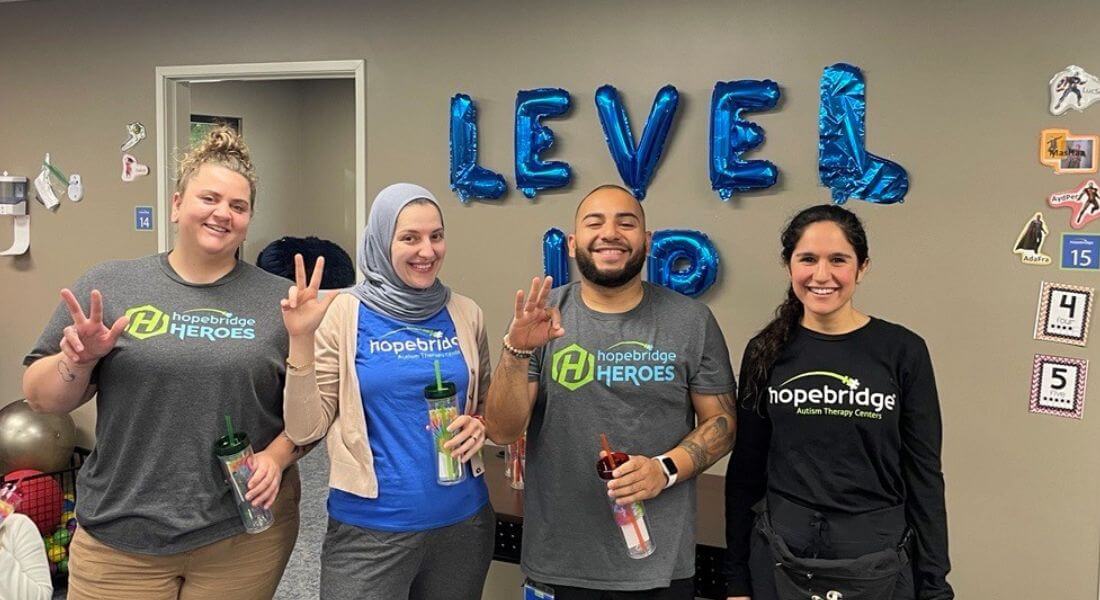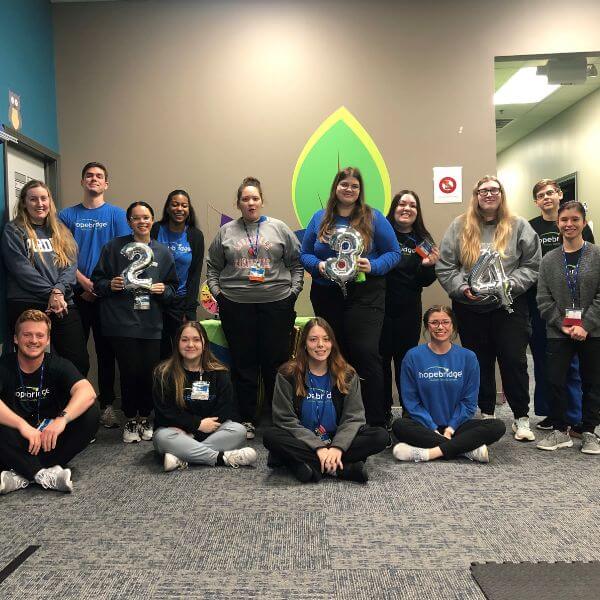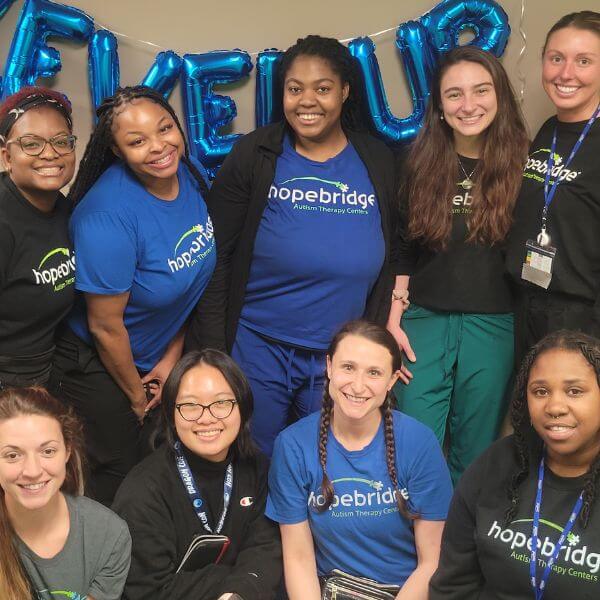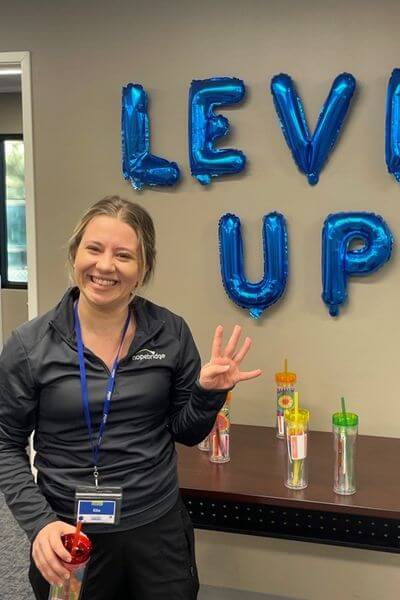Hopebridge Encourages RBT Career Ladder with Leveling Program
March 16, 2023
March 16, 2023

If you are a Registered Behavior Technician (RBT), chances are, you are awesome. You are an autism advocate working to serve others and making a big impact in families’ lives through everyday moments. You are doing important, tough and fun work all at the same time. What you’re doing is “enough” – it’s more than enough – but you may still be wondering, “What does my career path as an RBT look like? Where can I go from here?”
For some, becoming an applied behavior analysis (ABA) therapist or behavior technician is a stepping stone to becoming a Board Certified Behavior Analyst (BCBA). For others, the RBT role is already the dream job, as they’ve found their passion working directly with children with autism. Some are not attracted to the idea of going back to school to become a BCBA, yet desire more opportunities to grow their skills (and income!). The career ladder for RBTs like these is not always clear.
*RBT Leveling at Hopebridge Autism Therapy Centers enters the chat.*
Hopebridge’s leveling program is a way for our RBTs to continue to develop their skills and competencies while receiving promotions and merit-based pay increases throughout their careers.
“We want to invest in our Hopebridge employees. The leveling program is one way to help make RBT not ‘just a job’ or the next step on a journey, but a career all in itself,” said Hopebridge Director of Employee Experience Ali Thomas. “At the same time, it enhances our clinical quality. When you know better, you do better. This type of leveling ultimately leads to increased positive outcomes for our kids, which is what we are all here to do.”
The leveling path is open to all Hopebridge RBTs. It’s a competency-based system intended to reward our team members for the skills and merit they bring to the table. Rather than think, “One day I might be promoted,” it’s a clear path to promotion for these passionate therapists who want to advance their careers.

“Levels are opportunities to grow and tap deeper into gaining knowledge. I’m committed to making a difference in lives each day. Life will only change when you become more committed to your dreams than your comfort zone,” said April Simmons, RBT 3, of our therapy center in Roswell, GA.
There are four windows throughout the year in which RBTs can reach out to the leadership in their centers and say, “I’m ready to level up.” At that point they work with their BCBA team on competency checks at the local level. These opportunities are never pushed onto employees, who are instead encouraged to seek them out according to their own timelines and interest.
“I wanted to level up to refresh the knowledge so I can continue doing my job correctly and better help our friends here,” said Jacki Hubbard, RBT 2, who works in our Hopebridge center in Kokomo, IN.
Once an ABA therapist becomes a certified RBT, they become an RBT Level 1. From there, the program has opportunities for promotion to RBT 2, RBT 3 and RBT 4. We ask that RBTs remain at their levels for a minimum of six months so they can continue to learn and work towards mastery. External hires who already have their RBT credential may start at Hopebridge in a different hiring level, as we appreciate and reward experience in this field and the competencies they bring to our kids and families.
“Having the opportunity to level up means that I have a place in this company. It shows how much I have grown in six months’ time,” said Victoria Scott, RBT 2, from Hopebridge in Atlanta. “It means another level of leading new RBTs and showing my own leaders that they have done a great job mentoring me!”
The competency assessments are simply knowledge checks. We do not expect our team to study for hours at a time in order to move along the job ladder.

Most of the time, our RBTs already know the material and work with it daily, and the checks are in place to demonstrate those competencies. There are more clinical complexities at the highest level, but by that point, most of our RBTs seeking this level have already come across them as they enhanced their knowledge over their two or more years serving as behavior technicians. The program is designed so employees continuously build these skills as they work through the levels.
Depending upon the level and competency, applicants must be able to demonstrate specific tasks during their sessions with a patient, during role-play, or during an interview. The tasks cover themes such as measurement, assessment, skill acquisition, behavior reduction, documentation and reporting, and professional conduct and scope of practice.
Here are some examples of competencies RBTs can expect to demonstrate during the assessments:
As RBTs progress through the levels, they receive raises and promotions, in addition to special recognition. Along with our other promotions (such as case managers becoming BCBAs, RBTs becoming center managers or behavior analysts becoming clinical directors), RBTs who level up are celebrated during Hopebridge Bridging Ceremonies. Each honoree receives a shiny new name tag ribbon that features their new role in the organization so others can see what they have worked toward to get to this point.
“I absolutely love using the Bridging Ceremony as a platform to showcase the growth and development of our team in a big way,” said Leslie Hillis, DPT, who is a center manager and physical therapist at our clinic in Kokomo. I think our staff is excited about getting an opportunity to be recognized and receive their gift as they achieve each level. Ultimately, it’s a win-win … staff learns and grows, and as a result, so do their kiddos!”
All levels are celebrated, but those who are RBT 3 and RBT 4 play huge mentor roles in our centers, as they serve as senior clinicians. They are viewed as leaders and are tapped to provide support for their peers.

In case you’re wondering, no, the growth does not stop once an RBT reaches level 4. They are still eligible for annual merit-based raises and might be tapped to take on more leadership within the center. There will be more opportunities for them to shadow more complex cases and enrich their clinical knowledge as their career progresses. “Unlike other providers, there is no cap on the number of RBT 4 roles in a Hopebridge center. We reward expertise and loyalty. If you know it and you earned it, you get it,” said Ali. “It’s part of our push for value-based healthcare across the country. We know that when we have more senior, experienced clinicians, it’s not only great for our staff, but also for our kids and the broader science of ABA.”
Though we have crafted our program with the goal of making the RBT role a full-fledged career, some choose to put their skills to work in new ways. Some of our behavior technicians ultimately decide to go through our Fellowship Program to become BCBAs. Others – especially those who are RBT 4 – appreciate the opportunity to learn and choose to evolve their own skillsets through our Leadership Education and Development (LEAD) Program and Next Step Academy, knowing that they can continue to learn what they want at Hopebridge without the need to go back to school. Those who do so may be interested in a center management track.
“Leveling up to RBT 4 helped me gain further knowledge in ABA. I am also hoping that with the experience and knowledge I possess, I can assist with intakes and help new BTs feel welcome and comfortable with what they are learning as they go through their training,” said Savannah Westfall, RBT 4 at Hopebridge Autism Therapy Centers in Donelson, TN, who is also part of our Next Step Academy.
At Hopebridge, there is a clear career path for behavior technicians, but with a few forks in the road, the options and opportunities for RBTs are endless.
Are you interested in pursuing your career in autism therapy with Hopebridge? Savannah shared some advice for those looking to level up as an RBT.
“Continue to be the awesome RBT you already are! Doing the competency assessments feels like doing your BACB comps to take the RBT test. If there are any topics you feel stuck on, the BCBAs will help, and you can revisit it the next day. It helped me to review the assessment before my supervisor, BCBA Rebekah Hammond, started running it during sessions with me, and she was very open to helping me understand concepts that I may have been rusty on at the time. Much of the assessment can be completed during a normal session, so it’s really a breeze!” said Savannah.
Does an RBT position sound like a match for you? Take a peek at all that is available to you through a job in autism therapy at Hopebridge and apply to join our team with one of our open positions.
*Informed consent was obtained from the participants in this article. This information should not be captured and reused without express permission from Hopebridge, LLC. Testimonials are solicited as part of an open casting call process for testimonials from former client caregivers. Hopebridge does not permit clinical employees to solicit or use testimonials about therapeutic services received from current clients (Ethics Code for Behavior Analysts 5.07-5.08; BACB, 2020). Hopebridge does not provide any incentives, compensation, or renumeration for testimonials provided by a former client or client caregiver.
Team Spotlight
November 26, 2024
Finding Your Way Back Home: Why BCBA Gretchen Thompson Found Her Way Back to Hopebridge